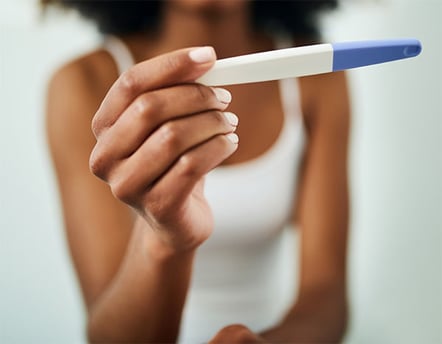 Does your internet search history look like this? …
Does your internet search history look like this? …
- What is an IUI?
- What is an IVF?
- What is the difference between IUI and IVF?
- What are the risks of IUI or IVF processes?
If so, you may be one of about 15-percent of women who are unable to get pregnant after 12 months of unprotected intercourse, and different fertility treatment options have likely crossed your Google search bar. The providers at Moreland OB-GYN know how many questions can run through the mind of someone struggling with fertility. Continue reading to learn about IUI and IVF treatment options.
Lack of fertility can have a number of causes, so your first step should be to visit with your OB-GYN and determine if there is a cause of your infertility. For most couples, there is only a 20-percent chance of pregnancy in any given month; 85-percent of couples will get pregnant in the first year of trying. In the second year of trying, the pregnancy rate is only about 5 to 10-percent.
So what if you need help conceiving? Will you use IUI or IVF? Which one is right for you? Let’s explore both options, and then discuss the pros and cons.
What Is IUI?
When people use the term “artificial insemination,” this is what they are referring to. It's a fairly simple treatment usually done in conjunction with fertility drugs. The most common medications used include clomiphene citrate (Clomid) or letrozole (Femara).
How Is IUI Performed?
Some IUI cycles are monitored with ultrasound, others may be monitored with ovulation predictor tests at home. During an ultrasound monitored cycle, women come in for an ultrasound during their menstrual cycle, typically day 2-4, to examine the ovaries and confirm there are no ovarian cysts that could interfere with ovulation. You may be started on fertility medication to help ensure successful ovulation. When ovulation is near, you will then schedule the IUI procedure. An additional medication may be recommended to more precisely time the perfect time for insemination. Here is typically how the procedure will go:
- Your partner will produce a semen specimen (in a private room) via masturbation after a few days of abstinence. If you are using donor sperm, your provider will have a different plan for you for this process.
- The sperm is then “washed” to separate it from the other semen components and to concentrate it. This process takes approximately 60 minutes.
- You will then come to the clinic for the insemination. A speculum is placed in your vagina to visualize your cervix.
- Finally, a small tube with the washed, highly motile sperm is inserted and the sperm is placed into your uterus.
Are There Any Risks With IUI? What if It Doesn’t Work?
If you are taking fertility drugs, the biggest risk is multiple pregnancies (twins, triplets, etc.). If too many eggs are developing on ultrasound, the insemination may be canceled.
If you don’t conceive after three cycles of IUI, referral to a reproductive endocrinologist and fertility specialist is recommended because you may require IVF to get pregnant.
Is IUI Right for Me?
You might be a good candidate for IUI if any of these factors relate to you:
- Male infertility. If your partner either has a low sperm count or low motility.
- Unexplained infertility. Sometimes, when no cause can be found for infertility, IUI has been shown to increase your chances of becoming pregnant.
You may not be a good candidate for IUI if:
- One or both of your fallopian tubes are blocked.
- You are in menopause or have diminished ovarian reserve. This is more common as women age.
- Severe male infertility is a factor —if the sperm count or motility is very low.
- You have severe endometriosis.
If IUI is not right for you, another option to look into is IVF.
What Is IVF?
IVF, or in vitro fertilization, uses a combination of medication and surgical procedures to help sperm fertilize the egg and help that embryo implant in your uterus.
IVF may take several months to complete the entire process; sometimes it works on the first try, but some people need more than one round to get pregnant.
You will first undergo screening to check the quantity and quality of your eggs and hormone levels, semen analysis, infectious disease screening, and a uterine exam. Additional tests may be ordered by your provider.
How Is IVF Performed?
For IVF, your provider will instruct you to take medications to make several eggs mature and ready to be fertilized. These medications include those for ovarian stimulation, for oocyte maturation, to prevent premature ovulation, and to prepare the lining of your uterus. Your doctor will determine which medications you need and when to take them.
After you have taken the medications prescribed by your provider, the following will then take place:
- Egg retrieval. This is done 34 to 36 hours after the final medication injection and before you ovulate. This is done under sedation through your vagina. The mature eggs are then put into a nutritive solution and incubated.
- Sperm retrieval. The most common method for retrieving semen is masturbation the morning of egg retrieval. Donor sperm is also an option to be used for this process. The sperm is then separated from the semen.
- Fertilization. There are two common methods. With the conventional method, healthy sperm and mature eggs are mixed and incubated overnight. With the secondary method, a single healthy sperm is injected directly into each mature egg. This second process is used if there are any issues with semen quality, quantity, or if prior IVF cycles didn’t work.
- Embryo transfer. Two to five days after egg retrieval, the doctor will insert a catheter into your vagina, through your cervix, and into the uterus. Then a syringe is used to place one or more embryos into your uterus.
Typical side effects after the embryo transfer include breast tenderness, mild bloating, constipation, and passing a small amount of clear or bloody fluid.
Are There Any Risks of IVF? What if it Doesn’t Work?
IVF does carry some risks. These risks include:
- Multiple births. IVF increases the risk of multiple births, especially if more than one embryo is put into your uterus.
- Premature delivery and low birth weight. IVF slightly increases the chance that your baby will be born early or with a low birth weight.
- Ovarian hyperstimulation syndrome. This can be from injectable fertility drugs and cause your ovaries to become swollen and painful.
- Egg-retrieval complications. The use of a needle to collect eggs can possibly cause bleeding and infection or damage to the bowel, bladder, or blood vessels. There are also risks associated with sedation.
- Ectopic pregnancy. About two to five-percent of women using IVF will have a pregnancy where the fertilized egg implants outside the uterus, usually in one of the fallopian tubes. This is not considered a viable pregnancy.
Remember, it may take several rounds of IVF before you become pregnant.
Is IVF Right for Me?
With the success rate of IVF hovering around 50 percent, it’s no wonder many couples consider it when they are having trouble conceiving naturally. But is it a good option for you? IVF may be a good option if you have these infertility diagnoses:
- You have blocked fallopian tubes. This is the reason IVF was developed. It bypasses the fallopian tubes completely.
- You have endometriosis.
- Unexplained infertility.
- Male infertility issues. A procedure can inject one healthy sperm to fertilize the egg, which is a preferred technique for men with a low sperm count.
- Decreased ovarian reserve. As you age, the quality of your eggs decreases. You might have to use donor eggs, but not to worry; the use of donor eggs with IVF achieves a similar pregnancy rate to those who use their own.
Who might be a bad candidate for successful IVF?
Any of the following conditions can interfere with the success of IVF:
- Fibroid tumors
- Ovarian dysfunction
- Abnormal hormone levels
- Uterine abnormalities
If you have any of these issues, you may have a lower rate or chance of a successful pregnancy with IVF.
IUI vs. IVF
IUI and IVF are very different procedures. But how do you know which one you should pursue? Here are a few pros and cons for each process.
IUI
IUI is the less invasive and less expensive option, so if time is on your side and you don’t have any factors that prevent you from trying it, IUI could be your first reasonable option.
There is less control over what happens when you’re using IUI because you’re just trying to optimize the conditions for conception. Conception rates with IUI are 10 to 12 percent if you’re under 35, however, if you are 40 or over, you’ll have a two to five-percent chance of pregnancy.
IUI requires less medication or even none at all! If you’re over 35 years old and have tried to get pregnant for at least 6 months or you are under 35 and have tried for 12 months, consult your OB-GYN to see if this procedure is right for you.
IVF
A substantial IVF advantage is that it has about a 50-percent pregnancy rate. This is because it bypasses the common problems relating to egg transport, and you use the specific egg that is most likely going to make a baby. The egg is already fertilized, and you can freeze any extra for later use. However, it is the more expensive option.
IVF requires fertility drugs, including two to three injections per day for 8 to 12 days. The process is also surgically invasive.
IVF has a higher success rate, but is expensive and carries more risks.

The Cost Difference Between IUI and IVF
The cost difference between IUI and IVF is fairly significant.
Each cycle of IUI can cost between $700 and $1,400 without insurance. IVF typically costs about $15,000 per cycle.
Of course, the cost depends on where you live, your insurance, and your medical situation.
How Moreland OB-GYN Can Help
At Moreland OB-GYN, we understand the physical and emotional strain you and your partner face from infertility, and not to mention, fertility issues are more common now than it was just a few decades ago. Our OB-GYN providers offer fertility exams and a number of options to increase your chances of pregnancy.
Fertility Testing, Evaluation and Treatment
Moreland OB-GYN is at the forefront for fertility testing, evaluation, and treatment. Moreland also offers preconception counseling and advice for staying fertile!
Moreland offers IUI
Come in and see us to discover if IUI is right for you. Our dedicated team is is here to help you find a solution, so we now offer IUI at our Waukesha OB-GYN clinic. Talk to us and let's review your options. Request an appointment with a Moreland intrauterine insemination specialist today.
Note: Moreland OB-GYN does not provide In Vitro Fertilization (IVF) services. If you require IVF, we can provide referrals to specialized fertility centers or collaborate with reputable IVF clinics to ensure you receive the comprehensive care and support you need.
We’re Here For You
The providers at Moreland OB-GYN are dedicated to providing women with compassionate OB-GYN care throughout life. This includes complete obstetrical care, gynecology, gynecologic and obstetric surgery, infertility services, preventive health care and more.
You can request an appointment online or give us a call at (262) 544-4411. We have convenient locations in Brookfield, Mukwonago, Oconomowoc, Sussex, Watertown, and Waukesha.









